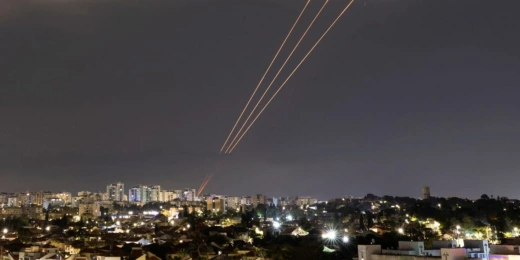Iran’s direct military attack against Israel marks a significant escalation, initiating the first direct iran attacks israel in recent history. With over 100 Iranian drones launched toward the Jewish state, this operation signifies a severe escalation in tensions between the two nations.
The preparatory measures taken by the U.S. and Israel, including heightened alert statuses and strategic defense initiatives, underpin the gravity of the situation and the potential for further escalation. This event not only impacts the involved countries but also has broad implications for world news, indicating a critical juncture in Middle Eastern geopolitics.
Background and Lead-up to the Attack
The recent Iran attacks on Israel can be traced back to a series of escalating events and deep-rooted political tensions. Initially, the conflict intensified with an Israeli raid on the Iranian consulate in Syria, which Iran cited as a provocation.
This was followed by an alleged Israeli strike on an Iranian military site in Syria, further inflaming the situation. Despite these provocations, Israel has not officially acknowledged its role in the Syrian strike.
Historically, the animosity between Iran and Israel has been fueled by ideological and regional conflicts. Since the 1979 Iranian Revolution, Iran has not recognized Israel’s sovereignty, often referring to it as the ‘Zionist regime’.
Conversely, Israel perceives Iran’s nuclear ambitions and its support for militant groups like Hezbollah and Hamas as existential threats. This longstanding rivalry was exacerbated by Iran’s support for the Syrian regime, using Syrian territory to transport weaponry to Hezbollah.
The conflict saw a significant escalation in February 2018 when a suspected Iranian drone entered Israeli airspace, prompting a robust Israeli military response against targets in Syria and Iran. This pattern of retaliation continued over the years, with Israel conducting numerous airstrikes on Iranian positions in Syria.
The situation escalated further with attacks on Israeli interests, such as the MV Helios Ray and cyber attacks on Israeli infrastructure in 2021, to which Israel responded with missile strikes on Iranian-linked facilities. These incidents underscore a persistent cycle of retaliation that has characterized the Iranian-Israeli conflict, setting the stage for the recent direct confrontations.
On March 13, 2023, Iran initiated an unprecedented direct assault on Israel, launching over 200 missiles and drones. This operation, conducted from western Iran using Fateh-313 missiles, marked a significant escalation in the long-standing conflict between the two nations. The Israeli military’s Iron Dome missile defense system successfully intercepted the majority of these attacks, preventing casualties and limiting physical damage.
The Iranian Revolutionary Guard Corps explicitly claimed responsibility for this offensive, stating their targets were primarily Israeli military sites and infrastructure. In response to the immediate threat, the Israeli Defense Forces heightened their defensive measures, deploying troops and urging civilians to seek shelter, particularly in areas where warning sirens sounded.
Additionally, Israel took the extraordinary step of closing its airspace to all domestic and international flights starting at 12:30 a.m. local time to ensure national security.
This aggressive move by Iran, coupled with Israel’s robust defensive actions, underscores the volatile nature of the region and the potential for further military engagements. The U.S. and Israeli forces collaborated to counter some of the Iranian drones, reflecting the strategic alliances at play. Meanwhile, the broader ramifications of these events continue to unfold, influencing global diplomatic and military responses.
International Response: Officials
The international reaction to the Iran attacks on Israel has been swift and widespread, with numerous countries expressing their positions on the conflict. Key global responses include:
United States and Allies:
- The U.S. has reinforced its “ironclad” support for Israel, actively participating in defensive operations against the Iranian drones and missiles. U.S. government employees in Jerusalem were advised to shelter in place, reflecting the serious threat level. Additionally, the U.S. has cautioned Iran against targeting U.S. personnel and facilities in the region.
European Union and United Kingdom:
- The EU and the UK have strongly condemned the attacks. The EU foreign affairs chief labeled the strikes as a grave threat to regional security, urging both sides to exercise restraint. UK Prime Minister Rishi Sunak described the strikes as reckless and destabilizing.
Middle Eastern Responses:
- Neighboring countries like Saudi Arabia and Egypt have voiced concern over the military escalation. Both nations emphasized the need for maximum restraint and a peaceful resolution to avoid further conflict.
These statements highlight a general consensus among international actors on the need for de-escalation and a return to diplomatic negotiations, underscoring the potential global implications of the conflict.
In the wake of the recent Iran attacks on Israel, the geopolitical landscape appears poised for significant shifts. The attack, declared as concluded by Iran, has not only heightened tensions but also set the stage for potential diplomatic and military developments:
- Diplomatic Engagements and Regional Stability
- Urgent diplomatic efforts are essential to mitigate the conflict’s escalation. The international community, including key players like the United States and European Union, must advocate for restraint and engage in peace negotiations to prevent further destabilization.
- Regional players such as Saudi Arabia and Jordan will play crucial roles in shaping the diplomatic landscape and influencing the next steps in the conflict resolution process.
- Economic and Military Implications
- The conflict could lead to increased defense spending by affected nations, straining economic resources. There is also a risk of disruptions in oil production and transportation, which could have global economic repercussions.
- Israel’s potential response to the attacks might include significant military actions, which could escalate into a broader regional conflict, affecting not only the direct belligerents but also neighboring countries.
- Long-term Regional and Global Effects
- The stability of the Middle East remains in jeopardy, with the possibility of the conflict spiraling into a wider regional war. Such a scenario would have far-reaching consequences, potentially drawing in various international actors and affecting global peace and security.
- The extent of damage and the nature of Israel’s response will be pivotal in determining the future course of regional dynamics. A forceful response could lead to a cycle of retaliation, necessitating a robust international diplomatic intervention to restore stability.
As the situation unfolds, the actions taken by Israel, Iran, and the international community will be critical in shaping the future geopolitical climate of the region.
Through the details outlined, we grasp the severe and escalating nature of the conflict between Iran and Israel, marking a critical juncture in Middle Eastern geopolitics. The direct attack by Iran using drones and missiles represents not just a significant escalation in their long-standing animosity but underscores the broader implications for regional stability and international relations.
The defensive measures and international responses highlighted throughout the article emphasize the urgent call for diplomatic interventions to mitigate further escalations and foster peace.
As the international community watches closely, the steps taken by global leaders, regional powers, and the involved nations in the days to come will be pivotal in shaping the course of events.
The potential for a widened conflict poses a risk not only to the Middle East but to global peace and security, highlighting the necessity for a balanced, thoughtful, and cooperative approach towards resolving the tensions. The significance of these actions, both militarily and diplomatically, cannot be overstated, as they hold the key to averting a deeper crisis and steering the region back towards a path of stability and peace.




